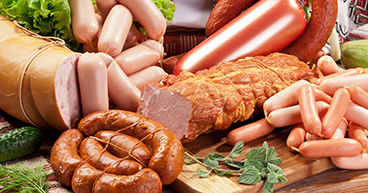
Research supports the old adage that you are what you eat. Over time, the food that you routinely choose to consume will impact your overall health, science has shown. Understanding and selecting the most healthful foods may be daunting when you’re faced with the many available options, especially when considering convenience and cost.
When considering which foods to buy and serve to your family, it’s important to consider whether and/or how they were processed before they reached the grocery shelf.
This article will explore:
- What are unprocessed foods?
- What are processed foods?
- What are ultra-processed foods?
- Why is processed food bad for you?
- Processed food and cancer: What’s the link?
- How to eat less processed food
If you’ve been diagnosed with cancer and are interested in a second opinion on your diagnosis and treatment plan, call us or chat online with a member of our team.
What are unprocessed foods?
Unprocessed simply means food as it’s found in nature, like fresh fruits and vegetables or raw, unsalted nuts, herbs, some spices and grains. Many of the naturally occurring nutrients remain in these foods. Sometimes, unprocessed foods are called whole foods.
Minimally processed food includes meat or eggs that have been cooked, but otherwise unaltered.
What are processed foods?
Throughout history, human beings have eaten processed food, which, broadly defined, means any food that has been changed from its natural state. That would include Grandma’s canned peaches—foods that still may be considered wholesome and nutritious.
Foods often are processed to preserve them, through canning, pickling or drying. Others are processed to extract a valuable element, like pressing olives to make oil. Some are processed to make them safe to consume, such as pasteurizing milk to kill harmful bacteria.
“People have a lot to say about processed foods being bad, but a lot of times, processed food is necessary, especially for people who might not make it to the grocery store every week and need to have canned or frozen food on hand. Or they may have a surplus in their garden and don’t want things to go to waste,” says Jayla Thurman, RDN, LD, Clinical Oncology Dietitian at City of Hope® Cancer Center Atlanta. “So, there definitely can be foods that are still healthful in that processed food category. It’s really those ultra-processed foods that we have the most concern with, in terms of their effect on your health.”
What are ultra-processed foods?
The more foods are processed—to make them shelf stable for longer periods of time or to make them visually attractive or more appetizing—the more likely they’ll have added ingredients like sugar, salt, fats and other additives that, in excess, may be unhealthy.
Thurman says it may be easy to identify an ultra-processed food just by looking at the label.
“Ultra-processed foods have a lot of things added to them that you wouldn’t find in your pantry,” including different types of preservatives, artificial colors and flavors, and hydrogenated fats, she says. “These are things that may add empty calories, or calories that you’re not getting nutrients from.”
Some common ultra-processed foods include:
- Chips, pretzels and similar packaged snacks
- Packaged cakes, cookies or pastries
- Processed meats like cold cuts, bacon and sausage
- Some flavored yogurts
- Breakfast cereals
- Sodas and soft drinks
Thurman offers another simple method to spot an ultra-processed food.
“Look at the food and ask, ‘What did this look like in nature?’ A potato chip and a potato are pretty different things,” she says.
Scientists have been trying to hone the definition of what constitutes an ultra-processed food and how the processing might change the nutritional profile, as discussed in the journal Current Developments in Nutrition. Ongoing research has prompted debates over dietary recommendations and public health policies.
“The category 'ultra-processed foods’ has been widely studied in relation both to diet quality and to risk factors for noncommunicable disease,” the researchers wrote. “The consumer is faced with cheap foods high in fat, sugar and salt, which are mass produced mainly by global multinationals, are designed for a long shelf-life, are quasi-addictive, and are heavily advertised.”
Statistics show that consumption of ultra-processed food is increasing globally, with the United States having the highest consumption rate at 58 percent of a person’s average daily calorie intake coming from ultra-processed foods, followed by the United Kingdom at 57 percent—with those ages 2 to 19 consuming at even higher rates, according to data published in the journal BMJ.
This has significance since numerous studies have shown that eating ultra-processed foods regularly over time has a negative impact on health.
“There is definitely a correlation between having a lot of ultra-processed foods in your diet and your risk for chronic disease throughout the life span,” Thurman says. “There’s not a specific limit you can have without risk. My general recommendation is to try to limit ultra-processed foods if you can and stick to eating foods in their most natural forms.”
Why is processed food bad for you?
Often, ultra-processed food is high in sugar, salt, saturated fats and substances added to help preserve the food and to make it more appealing to eat. These additives make the foods higher in calories and may exceed recommended daily amounts of salt, sugar or saturated fat as part of a balanced and healthful diet.
Compounding the health risks, people often eat more of these foods because they’re manufactured to taste good, they’re often cheaper than whole, unprocessed foods, and they’re quick and convenient since they don’t take much time to prepare.
Numerous research findings have linked diets high in ultra-processed foods with obesity, type 2 diabetes and gastrointestinal diseases, including Crohn’s disease and ulcerative colitis, as well as cognitive and mental health issues.
A recent study published in the BMJ found “direct associations” to ultra-processed foods and conditions such as cancer and respiratory and cardiovascular disease. “Greater exposure to ultra-processed food was associated with a higher risk of adverse health outcomes, especially cardiometabolic, common mental disorder, and mortality outcomes,” the report says.
Processed food and cancer: What’s the link?
The International Agency for Research on Cancer (IARC), working with the University of Vienna in Austria, found that a diet high in ultra-processed foods is associated with an increased risk of cancer and other diseases. In particular, the study found that processed meat and artificially sweetened beverages significantly increased cancer risk.
Another study identified the types of cancer linked to consumption of ultra-processed food, stating that “evidence shows a consistent significant association between intake of ultra-processed food and the risk of several cancers, including colorectal, breast and pancreatic cancer.”
Research has also shown the inverse is true—reducing the amount of ultra-processed food consumed can lower cancer risk, according to a study in The Lancet Planetary Health. When study participants substituted 10 percent of the ultra-processed food in their diet with minimally processed items, findings showed a 4 percent reduction in overall cancer risk, a 27 percent reduction in hepatocellular carcinoma and a 20 percent drop in esophageal squamous cell carcinoma risk.
Toufic Kachaamy, MD, Gastroenterologist and Chief of Medicine at City of Hope Cancer Center Phoenix, blames the modern American diet of fast and processed food for the rise in colorectal cancer in young adults. The average age of a patient diagnosed with colorectal cancer has fallen six years—from 72 to 66—this century. New cases of colorectal cancer in young adults has doubled in the past 20 years, and the disease is now the leading cause of cancer deaths for Americans aged 20 to 49, according to the National Cancer Institute.
“When did our diet become really horrible?” Dr. Kachaamy asks. “It’s when our diet became industrialized.”
Research suggests that a diet that includes frequent fast-food meals may upset the balance of good and bad bacteria in the microbiome, the colony of trillions of viruses, fungi and other microorganisms in the colon. While the microbiome’s role in cancer risk remains uncertain, researchers suspect poor gut bacteria may contribute to obesity, a leading risk factor for colorectal cancer.
How to eat less processed food
It’s important for cancer patients to consult with a registered dietitian to assess their nutritional needs and develop a customized plan to meet them, if necessary, Thurman says.
“We have to supply enough calories and enough protein so your body can function at its best capacity so you can continue to feel good during treatment and can continue to tolerate the treatment we’re offering,” she says, adding that dietitians can work with patients experiencing side effects of treatment like nausea or lack of appetite to find foods they can tolerate, while also developing a healthful dietary plan for those in survivorship.
Given the growing body of evidence linking ultra-processed food with cancer and other chronic disease, Thurman works with patients to try to adjust their diet to reduce the amount of these foods, which are often empty calories and won’t supply the necessary nutrients to help them thrive.
Below are some of Thurman’s top tips for reducing ultra-processed foods in your diet.
Have a plan
Before you head to the grocery store, think about the meals you’ll be eating and develop a meal plan. Make a list of needed ingredients to shop for.
“If you’re looking for things that can be quick and easy, ultra-processed foods might be what you reach for,” Thurman says. “If you plan ahead, then you might choose foods that require a little more time to prep but don’t have all the additives that a more processed food might have.”
Preparing whole foods doesn’t have to be time intensive. For instance, fresh fruit or vegetables can be a satisfying snack, and these often come pre-washed and cut to save prep time. And rather than buying a bag of popcorn, buy some popcorn kernels and pop them yourself.
“If you’re seeing it be prepared, you know exactly what’s in there, but if you’re buying it already prepared, ready to eat, you have pretty much no clue what that product went through before it landed on your table,” Thurman says.
Read labels
“Any food with a high daily value for salt or sugar—that’s a good indication of a pretty processed food,” Thurman says. “If the daily value is over 20 percent, it’s a good indicator that you’re getting a lot of added sugar or salt.”
Also, pay attention to the amount of saturated fat, especially hydrogenated fats, since high intake has been linked to cardiovascular disease.
High carbohydrate and fat content creates a dopamine surge in the brain, similar to the boost that comes from nicotine, according to research published in the journal Addiction. In fact, it’s estimated that ultra-processed food addiction occurs in 14 percent of adults and 12 percent of children, with candy and frozen desserts termed “gateway foods” for fostering unhealthful dietary patterns from an early age.
To counteract these effects, policymakers are weighing whether to mandate warning labels on certain foods and taxing these items like cigarettes. In the meantime, Thurman says to carefully read labels to be mindful of what you’re eating.
Be a smart shopper
Thurman recognizes that convenience is key to many people’s lifestyles, which is why City of Hope is launching a grocery shopping tour to help teach people how to shop smart.
“We’re never really taught how to go to the grocery store and shop,” Thurman says. “Even though there are healthy, affordable options, if you don’t know to look for them, you’ll just go with what you know will be affordable and get you through until the next time.”
Some hints she offers include shopping the perimeter of the store, where the fruits, vegetables and other whole foods are most often located. Also, be aware that the less processed a food is, the more time it’ll take to prepare. But the extra time may result in significant health benefits.
If you’ve been diagnosed with cancer and are interested in a second opinion on your diagnosis and treatment plan, call us or chat online with a member of our team.



